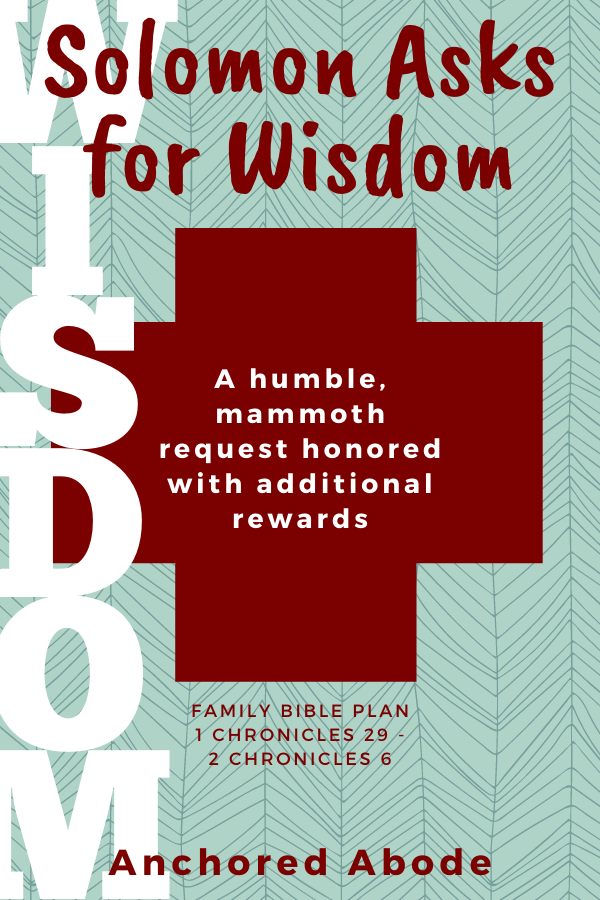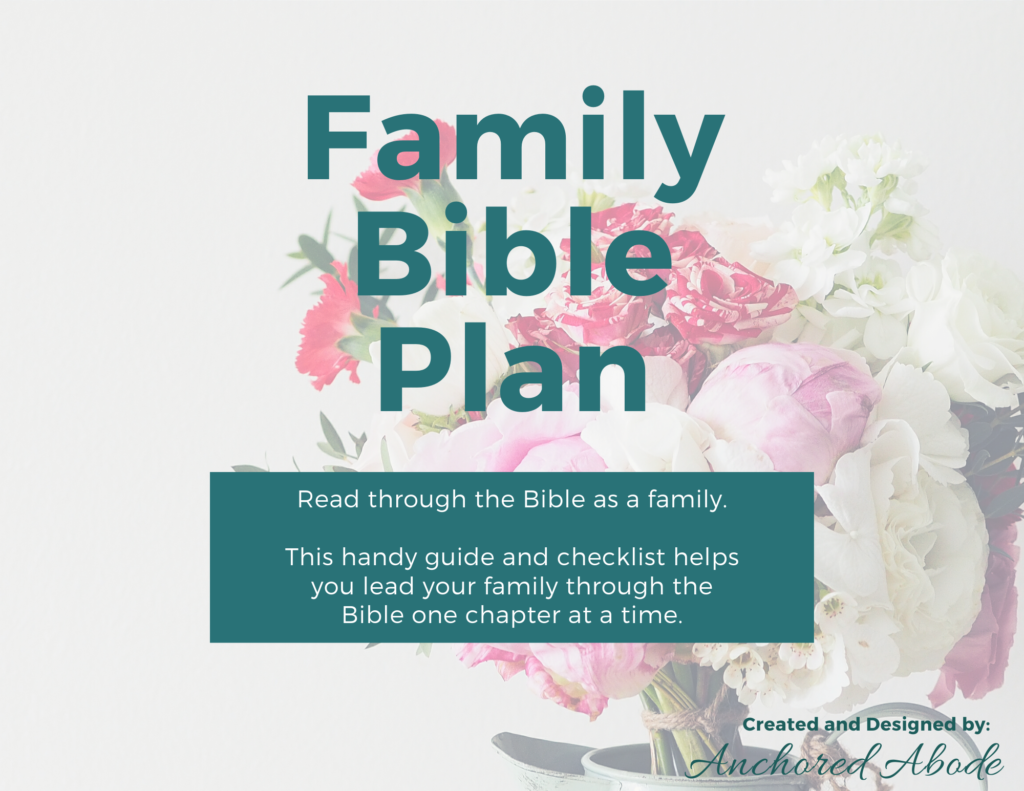You know those times, when your prayers supercede how you think God will respond. Will He grant a request that huge? Am I asking too much? Solomon had a unique position in life as a prince among many who became king. When Solomon asks for wisdom, he is making a huge request.
The Old Testament will often point us back to the Garden (original sin) and toward the New Testament (Jesus). Back then, Eve desired a knowledge she did not have. She heard about a way to obtain it, and boldly sought to achieve just that. Did she go to God first to request it? Was her heart in tune with what God desired of her?
Solomon’s heart status before the big ask…
Consider Solomon’s position, he was a newly elected king at quite a young age (around 20 years old) to a nation that was “as numerous as the dust of the earth”, while also having dealt with an older brother who tried to usurp the throne multiple times.
It was a precarious spot to be in, but read the language he uses.
And Solomon said to God, “You have shown great and steadfast love to David my father, and have made me king in his place. O Lord God, let your word to David my father be now fulfilled, for you have made me king over a people as numerous as the dust of the earth. Give me now wisdom and knowledge to go out and come in before this people, for who can govern this people of yours, which is so great?”
2 Chronicles 1:8-10
And Solomon said, “You have shown great and steadfast love to your servant David my father, because he walked before you in faithfulness, in righteousness, and in uprightness of heart toward you. And you have kept for him this great and steadfast love and have given him a son to sit on his throne this day. And now, O Lord my God, you have made your servant king in place of David my father, although I am but a little child. I do not know how to go out or come in. And your servant is in the midst of your people whom you have chosen, a great people, too many to be numbered or counted for multitude. Give your servant therefore an understanding mind to govern your people, that I may discern between good and evil, for who is able to govern this your great people?”
1 Kings 3:6-9
- He references the past history of God’s love that he saw given to his father;
- Acknowledges that David upheld his end of the agreement (“because he walked before you in faithfulness, in righteousness, and in uprightness of heart toward you”);
- Recognizes his situation logically (“but a little child” and “I do not know how to go out or come in”); and
- Recalls the fulfillment of promises made to his father and forefathers, specifically his own kingship and that the Israelites had become as numerous as the dust of the earth.
And I will establish my covenant between me and you and your offspring after you throughout their generations for an everlasting covenant, to be God to you and to your offspring after you. And I will give to you and to your offspring after you the land of your sojournings, all the land of Canaan, for an everlasting possession, and I will be their God.”
Genesis 17:7-8
“I will surely bless you, and I will surely multiply your offspring as the stars of heaven and as the sand that is on the seashore.”
Genesis 22:17
Only then do we see that Solomon asks for wisdom.
Not only that, but he recognizes his position that although king of an entire nation, he is still in need of help. He sought wisdom with a humble heart.
What exactly did he ask for…
Understanding Mind
The verbiage in 1 Kings states that he asks for understanding. The root word (shama) means he wanted to hear intelligently, to hear, obey, listen, be heard of, regarded, cause to hear, to proclaim, and sound aloud. Essentially, to hear wisdom.
The word ‘mind’ is translated from the Hebrew word ‘leb’ which means the heart, or heart of something. “The heart is considered to be the seat of one’s inner nature as well as one of its components.” (Strong’s Concordance)
Discern
Discerning here, means “to discern, to perceive, to observe, to pay attention to, to be intelligent, to be discreet, to understand; in the causative sense, to give understanding, to teach; in the reflexive sense, to consider diligently. … But actual discerning is not assured. Those who hear do not always understand. In the final analysis, only God gives and conceals understanding.” (Strong’s Concordance)
Govern
To judge or to govern “is much more inclusive than the modern concept of judging and encompasses all the facets and functions of government: executive, legislative, and judicial. Consequently, this term can be understood in any one of the following ways. It could designate, in its broadest sense, to function as ruler or governor.” (Strong’s Concordance)
Wisdom
“[Wisdom] is God’s gracious creation and is thus inherent in the created order. God alone knows where wisdom dwells and where it originates. (Job 28:12,20) Wisdom keeps company with all the other virtues: prudence, knowledge, and discretion. (Proverbs 8:12)” (Strong’s Concordance)
The Hebrew word itself is a noun “meaning wisdom, skill, experience, shrewdness and is rooted in a word that means to teach wisdom, be wise, make self wise, shew self wise, deal wisely, make wiser.” (Strong’s Concordance, paraphrased)
Knowledge
The word ‘knowledge’ in Hebrew means “intelligence or consciousness-knowledge, science, thought”. The root of this word (yada 3045), is a verb meaning “to know, to learn, to perceive, to discern, to experience, to confess, to consider, to know people relationally, to know how, to be skillful, to be made known, to make oneself known, to make to know”.
Yes, Solomon asks for wisdom, but so much more than just mere wisdom; we often combine it into one, all-amassing term. In reality though, he had a huge ask.
What exactly did get…
God answered Solomon, “Because this was in your heart, and you have not asked for possessions, wealth, honor, or the life of those who hate you, and have not even asked for long life, but have asked for wisdom and knowledge for yourself that you may govern my people over whom I have made you king, wisdom and knowledge are granted to you. I will also give you riches, possessions, and honor, such as none of the kings had who were before you, and none after you shall have the like.”
2 Chronicles 1:11-12
And God said to him, “Because you have asked this, and have not asked for yourself long life or riches or the life of your enemies, but have asked for yourself understanding to discern what is right, behold, I now do according to your word. Behold, I give you a wise and discerning mind, so that none like you has been before you and none like you shall arise after you. I give you also what you have not asked, both riches and honor, so that no other king shall compare with you, all your days. And if you will walk in my ways, keeping my statutes and my commandments, as your father David walked, then I will lengthen your days.”
1 Kings 3:11-14

God honored his mammoth request AND added on heaps of blessings: riches, possessions, honor. (Plus a conditional offer to lengthen his days provided he walks in the ways of David.)
Solomon asks for wisdom, yet receives a hundredfold more.
His wisdom…
Solomon’s wisdom was rooted in sovereignty. He came to God humbly and genuinely requested help, knowing full well who God was and that He is capable of answering that prayer.
Throughout Proverbs and Ecclesiastes, part of the Old Testament ‘wisdom books’, most theologians conclude a healthy portion are Solomon’s writings. The entirety of the wisdom books carry this central tenet: God is sovereign. The summed up version of the three ‘omnis’:
~ Omnipotent – all powerful
~ Omniscient – all knowing
~ Omnipresence – all present (everywhere at once)
Bringing it home, literally…
This lesson spans time. Looking back, Eve did not approach her desire in the same format. Looking forward, Jesus is the gatekeeper offering for us to approach Him with requests. Bringing it home, let’s approach prayers with an understanding not that we will receive heaps of additional blessings from a humble request, but that we need to recognize who God is first. Only then will we acknowledge our humble state with respect to a God who can move mountains.
Solomon asks for wisdom; and so should we.
Last Week
Anchored Truth Tuesdays
~It is appreciated but not required that you follow my social media accounts
[DISPLAY_ULTIMATE_SOCIAL_ICONS]
~A new Anchored Abode podcast (iTunes) has been started, and I would love for subscribers and positive reviews (SoundCloud)
~I do ask that you use the Anchored Truth Tuesdays logo above on your site somewhere or on the post itself; if you click on the picture above a new window will open with html instructions
~ Family friendly posts only (I reserve the right to delete any that are deemed inappropriate); with a direct link to a specific blog post
~It is appreciated if you spread the blogging love to those around you in the Anchored community by visiting their sites, following them, or liking/sharing posts
~We have a Pinterest group board, Anchored Truth Tuesdays, where all who link up are welcome to also upload their content–you’ll just need to like Anchored Abode first, and then request to join
~By submitting a link, you are agreeing to be added to our email list as well as allowing the use of pictures/content as featured posts on our social media accounts




Searching my.own heart, I wonder what I would have asked for…?
Same here! I can recognize how smart he was to ask for that after the fact, but if it was me….